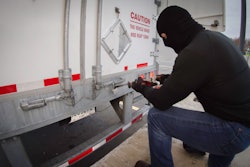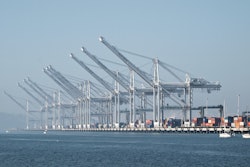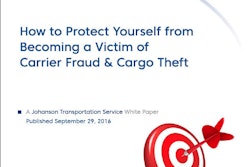
Cargo theft is not limited to high-value commodities such as electronics. According to CargoNet, food and beverage was the most stolen commodity in the United States last year.
Meanwhile, FreightWatch International (FWI), a subsidiary of Sensitech Inc, estimates the average value of stolen food and drink shipments between 3Q 2014 – 2Q 2016 was $86,149 with seafood being the highest valued sub-category at nearly $200,000. The most targeted sub-category was meats at slightly below $100,000. FWI reports that food and drink shipments remain the most stolen commodity domestically with 23 percent of thefts from June – August 2016. Of those thefts, 77 percent were FTL (full truck loads) and 15 percent FPU (fictitious pickups).
The future of cargo theft in the food and beverage sector is unclear since time of year, economy, and accessibility all factor into what cargo criminals look for as a target. Nevertheless, the FWI Supply Chain Intelligence Center continues to observe and report on any particular product, or commodity that starts to become a trending target in cargo theft incidents across the United States. FWI indicates that the food and beverage supply chain is particularly vulnerable because 99.99 percent of companies in the industry do not institute a layered security program in their transportation and logistics operations.
“Aside from the nut growers in California, little has been done to combat the problem,” FWI says.
In order to protect themselves from cargo theft, companies must pay high insurance premiums. According to TT Club, a top insurance provider, theft is the number three reason for a claim. By outfitting trailers with tracking devices that make it possible to detect cargo theft and recover stolen assets, companies reduce premiums.
“Cargo theft is a customer service failure as it undermines a carrier’s ability to meet service expectations,” remarks Lina Paerez, product marketing manager, ORBCOMM. “Cargo theft can permanently damage a company’s reputation. When a shipper loses a load due to theft, it disrupts the distribution cycles. If carriers can’t provide a safe work environment for their drivers, it can lead to poor driver retention.”
Real Time Monitoring
FWI maintains that assisted-GPS covert tracking technology embedded in cargo is the preeminent force multiplier with respect to combating in-transit cargo theft. Electronic Freight Security (EFS) programs offer a solution as they provide real-time, end-to-end monitoring of cargo shipments through embedded tracking technology. EFS also allows a shipper to maintain full visibility of the cargo for the duration of the shipment.
“As a complete virtual escort, this low-cost solution removes the vulnerabilities associated with human-based escorts, while significantly increasing the chances of recovery in the unfortunate event of a theft,” FWI states.
Proper EFS programs include pre-determined routes with immediate escalation protocols to ensure maximum compliance and security of the driver and cargo. Compliance to security protocols is critical. Immediate response and resolution to non-compliance incidents reduces opportunities for theft.
FWI got its start developing EFS technology to enable monitoring, reporting and recovery of high-value shipments in transit between manufacturing warehouses and delivery sites for cargo security. Its technology delivers real-time location, status and condition data as well as critical activity alerts that harden the supply chain and mitigate the risk of cargo theft. “Aluminum containers and cargo holds represent some of the most challenging environments for GPS devices,” FWI officials state. “FWI manufactured devices optimize leading location-based services and machine-to-machine (M2M) technology that works in impaired settings where other GPS devices do not.”
The latest FWI Single-Use GEO Tracker is at the forefront in tracking technology. This tracker takes the complexity out of cargo tracking by offering convenience and simplicity—eliminating the organization and management of tracking equipment.
Telematics devices can track the location and status of transport assets for complete fleet visibility. “Operators receive alerts when a problem is detected: a trailer makes an unplanned stop, deviates from its route or leaves a geofence,” Paerez explains. “This enables dispatch to react to problems quickly. When cargo is stolen, tracking devices make it possible to track the trailer for quick recovery.”
Trailer tracking devices are becoming smaller and more inconspicuous, which makes them harder for thieves to spot and identify. Such systems now support mobile applications, which allow operators and drivers to monitor status and manage alerts from anywhere.
“Devices are also becoming increasingly sophisticated. They are quicker and easier to install and they require almost no maintenance or battery changes—solar powered devices can report for anywhere from 5 to 10 years with no intervention and little sun exposure,” Paerez adds.
Trailer Breach
Trailer breach (unauthorized door opening) or load tampering is another problem. A trailer tracking solution that incorporates cargo and door sensors and delivers notifications/reports when a trailer is loaded or unloaded and when a door opens or closes can help carriers to detect theft early.
“A comprehensive system can also include cargo sensing technology that reports on load status—vibration, light, temperature, humidity, shock, etc.—which makes it possible for carriers to detect cargo tampering as it occurs,” Paerez says.
“A common way to identify a valuable target is when external devices are securing the doors,” states Scott Borsodi, director of business development, at Q Products and Services (QPS), creator of the Power In-Lock cargo security system. This system locks the trailer from inside, making it out of sight and out of reach of thieves or anyone attempting to gain unauthorized access.
“Our doors are locked electronically from our Jackson, Miss. headquarters as soon as the trailer is loaded,” explains Chris Wood, spokesman for KLLM Transport Services.
The locking mechanism is centrally controlled from KLLM’s corporate dispatch through telematics. Once the lock is activated, the door cannot be opened until the trailer reaches its destination. Drivers only have the capability to unlock the trailer through the use of a one-time code entered on a keypad attached to the trailer. This keypad communicates with the internal lock through radio frequency and is only utilized in the event the satellite signal is disrupted. The corporate dispatcher must provide the one time code to the driver. This prevents any type of collusion between the driver and an outside source from gaining access to the product within the trailer. The doors have sensors that document opening and closings and also indicate whether the trailer was locked or unlocked.
“Even in the event the external padlock and the shipper seal have been breached, we can demonstrate the trailer doors were never opened and satisfy the shipper’s and receiver’s quality control team that the product has remained safe during transit thereby avoiding a claim,” Wood remarks.
Q Products’ Borsodi stresses that Power In-Lock buys time in deterring theft. “Most thieves will give up if they can’t access the cargo within a minute or two,” he says. “By mounting a security solution on the inside of a container or trailer door, the thief doesn’t know what’s preventing the doors from opening. The internal feature is what makes our solution so unique.”
The importance of being able to prove a shipment was not tampered with cannot be understated. “A tampered shipment can be far more detrimental to a business than a few pallets getting stolen,” Borsodi states “Companies who intend to sustain a reputable brand simply can’t afford to take the risk of partnering with a carrier that is unable to help them comply with regulations,” states Borsodi.
Imminent regulations, specifically the Food Safety Modernization Act (FSMA), are probably the largest contributors forcing change, as shippers must be more diligent in selecting their transportation providers. As a result many shippers are taking a zero tolerance position as it relates to a trailer breach. Shippers are presenting transportation agreements to carriers that basically allow the shipper to claim the carrier for the entire shipment rather than being required to inspect the product and prove damages. Coinciding, transportation providers are employing reliable cargo security solutions when investing in new equipment and modern communication tools.
“Quite frankly, they have to if they want to haul their customer’s freight,” Borsodi says. “A common perception with regard to regulations is that they present challenges and increase operating costs. In reality, and speaking on behalf of some of our customers, when the proper technology is utilized it can exploit the weak links in the supply chain. As a result, they have realized cost savings by reducing shrink, cargo theft and minimizing supply chain disruptions.”



















